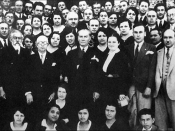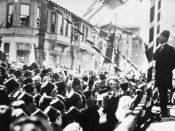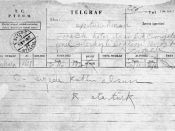The Republic of Turkey: Secularism at the Crossroads of Europe and Asia
The area of modern day Turkey has always been the crossroads of Europe, and Asia. The land has been the home to Jews, Christians and Muslims. Having been split up between two continents, and three different religions, it is a unique place considering it's past and potential. The Central Intelligence Agency of the United States reports that the Republic of Turkey has a population around 67.3 million people, 99.8% of which are Muslim. Unlike its Islamic-state neighbors, the Republic of Turkey has gone to great lengths to secularize, and it has felt the ramifications in its culture, political agenda and in its international relations.
Turkish Societal Evolvement
Mustafa Kemal Ataturk, the father of modern day Turkey, once declared, "We are not taking up the western civilization saying let's make an imitation. The things that we see as good in them and we find to be suitable for our own structure, we are adopting for the level of world civilization."
Since the proclamation of independence of the Republic of Turkey on the 29th of October 1923, many social reforms have taken place. The reforms of Turkey have drastically changed the cultural and political atmosphere. The former ruling body of the Ottoman Empire, which expanded across all of the Middle East and North Africa, the Sultanate, which ruled since the 14th century, was abolished in 1922. Also, in October of 1923 the Caliphate, which was an aristocracy, was abolished as well. These two changes were the key steps that were needed in order to create a democracy.
Under the irrepressible examples of the American and French revolutions, a nation must create a society in which titles and social classes are eliminated in order to preserve the equal standing...



Accurate and informative
Hi, this is a great essay. I am presonally from turkey and live in the US. This essay shows very accurate information. It's true that Turkey is considered to have "always been the crossroads of Europe, and Asia." It was the cause of many religious wars in earlier centuries (15th and 16th) and to this modern day, has had great influence in the world. Of the modern day news, you have provided many great examples and these clearly depict an accurate point of view.
This essay is very strong, and informative.
1 out of 1 people found this comment useful.